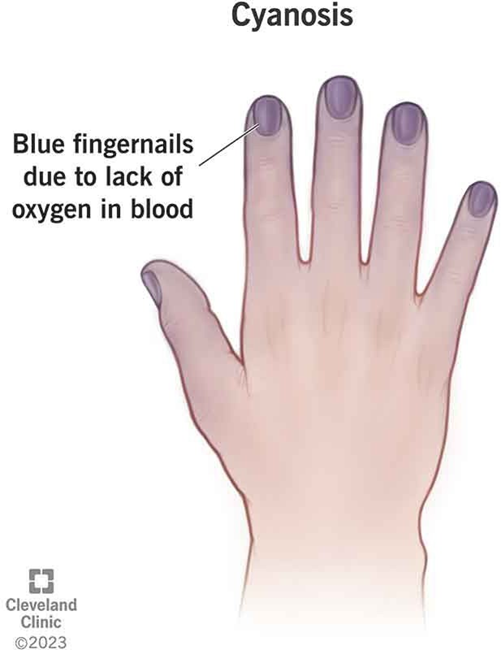The nurse notes that a client has cyanosis of the toes and fingertips. Which vital sign should the nurse obtain first?
Heart rate.
Blood pressure.
Temperature.
Respiratory rate.
The Correct Answer is D
Choice A reason: While heart rate is important, it is not the most immediate concern when a client shows signs of cyanosis.
Choice B reason: Blood pressure is a critical vital sign but does not directly address the issue of oxygenation, which is suggested by cyanosis.
Choice C reason: Temperature is less relevant to the immediate assessment of cyanosis, which is often related to oxygenation issues.
Choice D reason: Respiratory rate should be assessed first as cyanosis is a sign of potential hypoxia, and the respiratory rate can provide immediate information about the client's breathing and oxygenation status.

Nursing Test Bank
Naxlex Comprehensive Predictor Exams
Related Questions
Correct Answer is C
Explanation
Choice A reason: Offering positive reinforcement is a good practice in teaching, but it does not directly facilitate the learning of problem-solving strategies.
Choice B reason: Physical demonstrations are more suited to teaching psychomotor skills rather than problem-solving strategies.
Choice C reason: Simulation activities allow individuals to practice problem-solving in a controlled environment, which can enhance learning and retention of these strategies.
Choice D reason: Verbal analogies can aid in understanding concepts, but they are less interactive and engaging than simulation activities when it comes to learning problem-solving strategies.
Correct Answer is ["A","C","E"]
Explanation
Choice A reason: Orienting the client to their surroundings is essential for a confused patient. It can help reduce anxiety and prevent further confusion. It is a non-invasive, immediate intervention that can provide comfort and safety to the patient.
Choice B reason: Closing the client's room door is not recommended as it may increase the patient's feeling of isolation and can be a safety issue if the patient needs immediate assistance.
Choice C reason: Escorting the client back to the room is a correct action. It ensures the safety of the client by preventing falls or wandering, which could lead to harm.
Choice D reason: Raising all four side rails on the bed can be considered a form of restraint and is not recommended. It can increase the risk of injury if the client attempts to climb over the rails and can contribute to feelings of confusion and agitation.
Choice E reason: Securing a bed alarm on the mattress is a correct action. It alerts the staff if the client attempts to leave the bed, allowing for quick intervention to ensure the client's safety.
Whether you are a student looking to ace your exams or a practicing nurse seeking to enhance your expertise , our nursing education contents will empower you with the confidence and competence to make a difference in the lives of patients and become a respected leader in the healthcare field.
Visit Naxlex, invest in your future and unlock endless possibilities with our unparalleled nursing education contents today
Report Wrong Answer on the Current Question
Do you disagree with the answer? If yes, what is your expected answer? Explain.
Kindly be descriptive with the issue you are facing.
